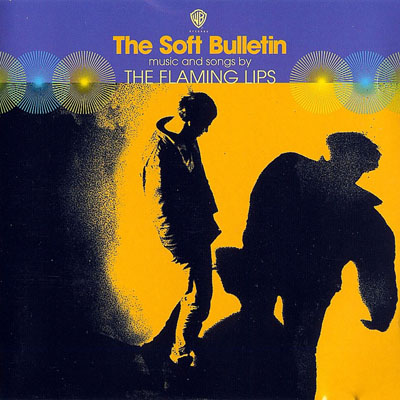
The Soft Bulletin by The Flaming Lips (1999)
One of my long-standing prejudices against The Flaming Lips was that the singer's thin warbling voice (which has gotten some comparisons to Neil Young over the years) makes it seem like he's being tongue-in-cheek. Plus, the lushly orchestrated arrangements on albums like this one only exacerbate the feeling of campiness. I have noticed over the years that a common problem for American music artists is that they sometimes come across as serious and joking at the same time, as if they are unable to commit fully to their lyrics and be one hundred percent sincere. Frank Zappa, for example, was probably the most flagrant abuser of this "just kidding" lyrical duality, an artist who, I'm guessing, probably had great influence on the music of The Flaming Lips.
After several listenings of this album, however, I have reached the conclusion that lyricist/vocalist/guitarist Wayne Coyne is serious in his songwriting efforts, and the nudge-and-wink cheesiness is mostly unintentional. He may have been intentionally campy earlier in his career, but he makes it clear with the scope and immensity of albums like this one that he wants to be taken seriously as an artist. You wouldn't put this much creative effort into something just so you could pull the rug out from under your listeners and say, "Ha ha, you thought I was being serious!" At least, I hope you wouldn't.
Fortunately, The Soft Bulletin is a delight for the ears, whether or not you are convinced of its lyrical integrity, and its reputation as one of the best albums of the 90s is well deserved. The sonic world created by the Lips on this disc is like no other. True to the album's title, the songs are mostly soft and free-floating, not unlike The Moody Blues in their psychedelic prime.
"Race for the Prize" opens the album with a cheerful wave of Mellotron, piano, and harp. The lyrics inform us that: "Two scientists were racing for the good of all mankind. Both of them side by side, so determined. Locked in heated battle for the cure that is the prize, but it's so dangerous, but they're determined." Is this meant to be cautionary tale about technological progress? Or perhaps it's an autobiographical reference to the band’s two main songwriters, Wayne Coyle and Steven Drozd. The meaning, as with many other songs on this disc, is basically a big question mark, but one that makes you want to lay back in the green grass on a warm spring day and watch butterflies fluttering around.
The second song, "A Spoonful Weighs a Ton," opens with a nice passage of synth-strings, piano, flute, and oboe. In a possible continuation of the story told in the first song, our two scientist friends have their sought-after breakthrough, which brings about a utopian social state: "And though they were sad, they rescued everyone, they lifted up the sun." The serene verses are finished off with bursts of drums, synth, and eerie uni-tuned steel guitar, which cast doubt on the permanence this new perfect world. The sci-fi concept seems to end after the first two songs (or does it?), with the rest of the album being more personal and philosophical in nature, touching on the themes of mortality, injury, and insect bites.
The album's title is derived from the song "The Spark That Bled" which contains the memorable line, "What kind of weapons have they got / the softest bullet ever shot." It is unclear whether this is a reference to the police in Mr. Rogers' neighborhood, or the staff of an insane asylum, or quite possibly, the Democratic Party. A "soft bullet" is an interesting concept, perhaps it refers to a social paradigm shift of some kind, or as the music suggests, a dose of mood-altering chemicals (which would not be endorsed by this website, of course).
"The Spiderbite Song" sounds like one of the more lighthearted moments on the album, but is actually based on more serious events in the lives of the band members. The song contains one of the albums' few references to romantic love, which is compared to a deadly spider bite and a car crash. Personally, I like a good love song every now and then. Love can be a great motivational force in life. Obviously, Coyne had a different view of the subject when he wrote the songs for this album. He continues this bug bite/love analogy in the following song, the happy-sounding "Buggin'," which compares the "buzz of love" with mosquitoes, while synthesizers make funny bug-like sounds.
The second half of the album delves into theological themes, and seems to walk a fence of indecision between religious fervor and stoic atheism. "What is the Light" is a stark contrast to the silly bug song that precedes it, and provides one of the most musically dramatic moments on the album, with lyrics that question the nature and existence of spirituality. The song is followed with a calm and contemplative instrumental called "The Observer," which almost could have been a track on a Pink Floyd album like Meddle or Atom Heart Mother.
Who is observing is left up to the listener, but I'm guessing it might be the central figure in the next song, "Waiting for a Superman." Using the Man of Steel as a thinly veiled symbol of the Big G, Coyne encourages his rag-tag congregation to: "Tell everybody waiting for Superman to hold on the best they can. He hasn't dropped them, forgot them, or anything. It's just too heavy for Superman to lift." Too heavy for Superman to lift? Well, that's not good news, but it does kind of make sense. An earlier lyric in the song says "It's a good time for Superman to lift the sun into the sky." Now technically, the sun might or might not be too heavy for Superman to lift, but if he did move the sun, the consequences for our planet would be disastrous, and would throw it and the rest of the solar system into a state of chaos. And, of course, what appears to be the rising sun here on the planet's surface is caused by the earth's rotation. Trying to speed up the earth's rotation for an earlier sunrise would also be a big mistake. The message here, maybe, is that only the natural cycles of things (time, in other words) can cause the sun to rise. What we really need is not more sunshine, but more patience and wisdom. Besides, I've always been more of a night person. I know that was probably an extreme over-analysis, but I was on a roll so I just went with it.
"Suddenly Everything Has Changed," one of my favorites here, is a bit of introspective psychedelia that plays like a low-key version of the Beatles' "Day in the Life," while the overblown orchestration of "The Gash" comes across as self-parody as it compares life to a battle, and urges the wounded among us not to give up -- a clear example of The Lips' presentation of a serious message in a "just kidding" musical wrapper.
The grim reaper gets a hippy makeover in "Feeling Yourself Disintegrate," the next-to-last song on the album, with lyrics that convey the alright-ness of death, stating matter-of-factly, "Life without death is just impossible." I suppose if anybody could put a cheerful, psychedelic spin on the subject, it would be The Flaming Lips. My best guess at their meaning is that they're doing a "Circle of Life," a la The Lion King. Death is part of the normal, natural cycle of things, so no need to get uptight. Just close your eyes and be at one with the universe. The only problem is, I never liked that movie, and the part where Coyne sings, "feeling yourself disintegrate" over and over again doesn't really make me feel all warm and fuzzy about my mortal condition. Lyrically, this song baffles me, but the vocal melody is very pretty and John Lennon-esque, and as the Osmonds used to sing, "One bad apple don't spoil the whole bunch, girl."
If this album has an overall message, maybe it is "life is short, so don't waste it," and maybe, "technological progress will be our undoing," and possibly, "our keyboard player needs to get back into rehab." I suppose any number of meanings could be extracted from an album like this, but the sonic inventiveness of this magnum opus makes it a vital addition to any music collection.
Reviewed by Somebody 7/13/15
See more Favorite Albums of the Moment





